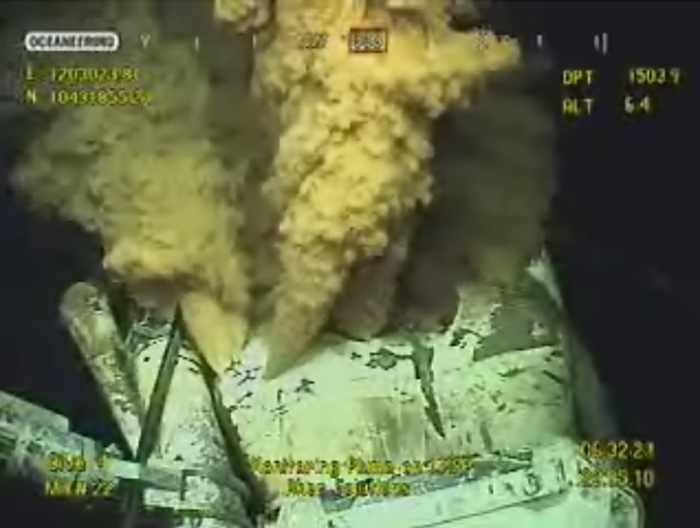Remember the BP “top hat”? It was one in a series of desperate attempts by the company to capture the oil gushing into the Gulf of Mexico after the Deepwater Horizon drilling rig explosion last year. The top hat, mocked though it was, managed to capture and remove 679,000 barrels of oil from the crippled well, pumping it to nearby tankers.
As it turns out, this salvaged oil translated to $47.3 million in proceeds for the three oil companies who leased drilling rights on the rig. Now, the Deepwater Horizon court case underway in Texas is dredging up the unprecedented circumstances of those profits, and a fight is underway to define the regulations governing them.
Yesterday, the United States filed a claim against one of the three drilling companies who profited—to the tune of $11.8 million—from the oil retrieved from the emergency mechanism. Anadarko E&P Company (AE&P), a subsidiary of Anadarko Petroleum Corporation (APC), holds that it was no longer a lease-holder in the drilling operation at the time of the explosion, and therefore is not a responsible party in the tragedy.
The US alleges that AE&P is liable in the oil spill because it did not transfer its interest in the lease for the Macondo Prospect prior to the Deepwater Horizon tragedy. However, AE&P claims that it did in fact transfer title on April 15, 2010, five days prior to the explosion, to APC, its parent company. The reassignment was approved by the Minerals Management Service (MMS), a government regulating body now called the Bureau of Ocean Energy Management, Regulation and Enforcement (BOEMRE).
AE&P calls the U.S. claim a “last-ditch effort” to engage in a “fishing expedition” by attempting nullify its own approval of the transfer.
“The United States now argues, unpersuasively, that the assignment was somehow “last-minute” and sought to “retroactively” transfer liability,” reads AE&P’s response to the U.S. claim. “These arguments are wrong.”
The U.S., however, says that since assignment was not actually approved by the MMS until April 28, 2010, AE&P was still a lease-holder on April 20, the date of the explosion.
There is also a battle raging over whether the overall amount of royalties paid should include oil received from the top hat operation. AE&P is quibbling over the definition of the word “production.” Their court statements attest that the unconventional means of the operation fall outside of the definition of the word, and thus outside of legally royalty-warranting territory.
“Only oil and gas volumes derived from a successfully completed well constitute production, and in turn, are subject to royalty,” a court filing from the drilling company reads.
The United States thinks otherwise.
The flaw in Appellant’s narrow reading of the term “production” is perfectly illustrated by the present case. Here, large quantities of oil were severed from the formation by the drillng of the Macondo well. This oil then emanated from the Macondo well. A significant amount of this oil, 679,000 barrels, was captured by various devices. This oil was then removed from the lease, metered, processed, and sold, just like oil produced though more conventional means. Arguing that this oil is not royalty bearing because there was not the standard orderly progression ignores reality.
If the means of acquiring the oil is not ultimately considered “production,” AE&P would retain the $2 million dollars otherwise paid in royalties to the government, likely giving licence to the two other co-lessees (BP and MOEX) to demand the same.
The Deepwater Horizon case is a veritable tangle of similar claims between and among the federal government and all involved drilling companies.
Transocean Offshore Deepwater Drilling filed a motion this week to require that seven individuals who would be testifying against the company submit to physical and mental investigations before the court can hear their claims. The claimants, whose claims have apparently been recently settled with Transocean, filed a fiery response this morning objecting to the demands for medical examination.
Summonses were also issued yesterday for several arms of BP, who are expected to testify in the trial against Deepwater Horizon in the Texas court in the near future.










